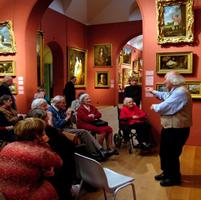It was of course the Oxford Institute on Ageing who got the ball rolling. Fifteen years ago the staff team at the Dulwich Picture Gallery in London were stirred by reports of widespread poor treatment of older people. They created a vision for art as an enriching experience for people who were marginalised, lonely or just bored. They asked Sarah Harper and Kate Hamblin to evaluate their ‘Good Times’ programme of tours, creative workshops, celebration events and intergenerational work. The Oxford researchers showed that participation reduced social isolation, linking people with new social networks and with a creative experience, strengthening a sense of identity and belonging. One participant caught the mood: “I’m really looking forward to it, thinking about meeting up with everyone again”.
Meanwhile Dr Gene Cohen had been breaking new ground in the USA; his influential study showed benefits from participation in cultural programmes, ranging from reduced loneliness to improved morale. And the Baring Foundation was advancing its tradition of far-sighted funding. It studied the evidence, before funding a remarkable decade-long programme of inspiration. An early report in the Baring programme spotlighted leading arts initiatives whose work tackled loneliness. This helped the Campaign to End Loneliness focus on arts pioneers, such as Entelechy Arts’ community programme ‘Meet Me’ with which I am involved as a Trustee. Each addressed that common painful gap, between the quality and quantity of the social contacts you have and those you desire, which we call loneliness.
Since then the evidence base has increased hugely in volume, and it has offered firm foundations of proof for our everyday instinctive sense that taking part in something “artistic” lifts us and bonds us with others. Several research studies show that singing brings people together. Dance, art classes and theatre have been shown to give a greater sense of belonging to people with dementia and their carers. A systematic review of interventions targeting loneliness and social isolation suggested that new technologies and community engaged arts might be seen as a promising tool for tackling social isolation and loneliness among the older individuals. Professor Daisy Fancourt’s work has been a huge central motor for this issue, recently elaborated in her scoping review for the World Health Organisation. Out of nearly a thousand research references she cites 50 studies of the way the arts promote social bonding and cohesion, and reduce isolation and loneliness.
There are some signs that all this is gaining political attention. Three years ago, an impressive report, ‘Creative Health’, for the Westminster All-Parliamentary Group (APPG) on Arts, Health and Wellbeing, drew together the emerging body of knowledge. It argued for change across all sectors, from academics and research councils to arts funders and policy-makers, to transform the role of cultural participation in society. The following year the UK government appointed a Loneliness Minister – the first in the world - and produced a loneliness strategy which addressed 60 areas of action including a crucial enabling role for Arts Council England. The other devolved governments in the UK have made loneliness a policy priority; and Northern Ireland, Scotland and Wales have in fact led the way for creative ageing.
So what does this all amount to? Will this accumulating body of knowledge change the values and funding priorities of government and civil society, and back more energetically the provision of the activities which for so many of us make life worth living ? Will all our painstaking learning actually travel somewhere?
I believe it could. One of the APPG’s key directions was to urge ‘social prescribing’ to promote healthier societies. The commitment of Public Health England to ‘personalised care’ has certainly been sincere, though overwhelmed for now by its recent coordinating work to combat the virus. By 2023 every GP practice must offer social prescribing as an integral part of its service. The task for the health and social care sectors, and for community agencies, is to make that policy full-blooded reality.
To which end it is crucial that four key barriers are surmounted, which all relate to the issue of access. We will not be able to enjoy that dancing class or singing group, or visit that life-enhancing gallery, unless we are made aware of such opportunities by well-informed social prescribers who are carefully attuned to our individual wishes and hopes. Far easier said than done. We won’t venture outside our front door unless our neighbours and friends give us confidence to take that first scary step, and perhaps offer some company on that first journey or two. We simply won’t get there if the bus doesn’t work and community transport isn’t available; and for those of us who can’t get out at all, we won’t have the joy and social connection available digitally unless there is far more decisive action to tackle what has grown during lockdown to a digital chasm. A drive is needed to help all of us, whatever our personal challenges, to enjoy digital technologies, such as - a personal favourite - virtual choirs (for which, perhaps surprisingly, there is solid research evidence of strong social bonding).
These are mountains to climb. Huge pressure on funding, time and other perceived priorities may limit ability in health and social care to make this happen. It would be a depressing anticlimax if social prescribing were to amount to no more than the genial handing out of an out-of-date and incomplete list of local activities to the many visiting their GP who are lonely.
But Covid-19 has also shown the abundant willingness of neighbourly communities to reach out and help people find their way to their desired pleasure or pastime. This must be harnessed. And if the Covid-19 experience has shown us anything, it is that people need people, and that we all need something to get out of bed for every day. It’s worth quoting George Bernard Shaw one more time: “we do not stop playing because we grow old – we grow old because we stop playing”.
About the Author
Paul Cann has held senior roles in the UK voluntary sector for the last 30 year. An English graduate of Cambridge University, he has been active in work to address ageism, poverty, social exclusion and dignity in care. In 2008 his Help the Aged team won 5 national charity awards for its campaigns which led to the Equality Act, and in that year he was awarded the medal of the British Geriatrics Society for an outstanding contribution to the interests of older people. He was a Visiting Fellow of the Oxford Institute of Population Ageing from 2004-2007 and the International Visiting Fellow of the Australian Association of Gerontology in 2016. In 2011 he co-founded the Campaign to End Loneliness. He was appointed OBE in the 2020 New Year's Honours List
Opinions of the blogger is their own and not endorsed by the Institute
Comments Welcome: We welcome your comments on this or any of the Institute's blog posts. Please feel free to email comments to be posted on your behalf to administrator@ageing.ox.ac.uk or use the Disqus facility linked below.













